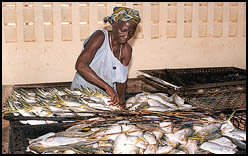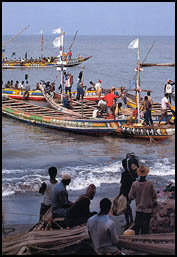 FISHING: A SECTOR WITH GREAT FUTURE FISHING: A SECTOR WITH GREAT FUTURE |

The fishing sector contributes largely to the Guinean economy. Its contribution is around 10% of GDP. It contribution in terms of employment, value added and nutrition is major. Conscient about its role in the economy, the government has put a director for the fishing industry in charge of the FAO / GUI. Their objective is to provide technical assistance to the state as well as to elaborate an action program for the durable development of the fishing. Over this past decade the authorites have deployed intense efforts that have made maximum economic and social benefits possible, which the country can take from the rational exploitation of the exclusive economic zone (ZEE).
This has allowed an considerable increase in the consumption of fish from 7.4 kg per person in 1989 to 13kg in the year 2000. The Guinean waters are home to a number of different types of fish coveted by the international market. Among these is the carp, the captain fish, sole fish, shark and the bougga in the interior of the country. The fishing sector is subdivided in maritime fishing, which in turn is divided into industrial and artisan fishing, and into continental fishing. Foreign ships and some national companies, like SIP Bourouma and Thiangui SA, Cogip, Soguipeche, mostly practice industrial fishing. Maritime fishing is the most practiced type of fishing today, which is treated after debarking. The principal method of conservation is naturally the storing in cold rooms. The efforts the past years to develop maritime fishing has invested around 56 dollars. This has given remarkable results due to the improvement of the socio-economic production and commercialization. the fishing industry has benefited from a expanding market because of the conversion of the fishing wharfs and the rehabilitation of the principal road axes and the liberalization of commerce.

The fishing industry is evaluated at a volume of 75 000 tons having a value of 90 million dollars. This represents 70% conversions and 50% value. The fishing sector also employees 15 000 and compromises 10 000 fishermen.
The exporters of fish and crustaceans towards European countries, and principal partners of the government have gone from 700 tons in 1989 to more than 2000 tons today for a total turnover of 8 million dollars. In 1998, the state implemented a project to control fishing products. The objective is to help the government conceive and put into place a national insurance system controlling the quality of fishing products based on HCCP (hazard analysis crital contrôl point) in order to satisfy the sanitation requirements of the European Union and the United States, the principal markets Guinea wants to conquer. | Mr Amadou Tall, an interntional consultant affirms that "the acquisitions of the project on site are satisfying. We are satisfied to affirm that the legislation is modernizing, and hence the inspection services have the capacity to reinforce the existence of an organigramme, equipment, a veterinary laboratory for product analysis through PCPEA."

Continental fishing is mostly practiced throughout the country but mainly in upper Guinea where most catches come from. This activity is mainly practiced by professional (Samoro, Bozo, and occasional agro-fishing women). The production in this fishing sub sector has gone from 2000 tons to more than 4000tons, today.
For Mr. Tall the training of executives and operators in the fishing sector is essential to fill in the hygene conditions that are fixed by the EU. The creation of the industrial company of Koba (Sakoba) permits exports to grow at 1800 tons for a turnover of 18 million dollars. The potential for Guinea to become one of the main players in fishing exports in the American and European markets exists but its infrastructure is still insufficient. Thanks to the assistance coming from the FAO, and the government efforts the EU has decided to place Guinea for the time being as a B category export country in terms of fish. Guinea's goal therefore is to export up to 10 000tons in the during the next five years.
Look at Jasmin Trading House , specialized in commercializing fresh fish. |

